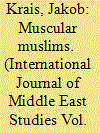| Srl | Item |
| 1 |
ID:
187541


|
|
|
|
|
| Summary/Abstract |
Kadriye Hüseyin was a member of the Egyptian ruling family and a prolific female intellectual, who has been largely ignored by scholars of late Ottoman Empire and modern Egypt. Focusing on Kadriye Huseyin’s works, which she wrote in Ottoman Turkish, this study examines the situational nature of identity in early twentieth century Egypt and, challenging the conventional narratives, argues that Ottoman consciousness continued to inform the worldviews of the Egyptian ruling elite until the First World War. The article first presents Kadriye Hüseyin as an intellectual, who identified herself as an Ottoman in various historical contexts. It then demonstrates how she was influenced by the Islamic reformist thinkers who had a major impact among the Ottoman and Egyptian intelligentsia in the early 20th century. Finally, the article introduces Kadriye Huseyin as a female intellectual, whose works argued for improving women’s status in the Muslim world from an Islamic reformist perspective.
|
|
|
|
|
|
|
|
|
|
|
|
|
|
|
|
| 2 |
ID:
169273


|
|
|
|
|
| Summary/Abstract |
Reformist British South Asian Twelver Shia Muslims emphasise practising Shia Islam in daily life beyond the month of Muharram by living a piety-led life; they encourage their followers to ‘become’ a Shia Muslim rather than just ‘being’ one. The reformist British South Asian Shia ulama, mostly trained in Shia seminaries based in Qom and Najaf, advocate the adoption of an Islamic life-style compatible with the economic, political and social challenges British Muslims face. Many British South Asian Shia Muslims view these piety narratives with contempt. They consider that the narratives on living a piety-led life privilege Islamic lifestyle like praying and reciting the Qur’an daily over Muharram ritual commemorations. These Shia Muslims see the growing popularity of piety-narrative as an apologetic response by Shia reformists to the growing influence of Salafis and the Tablighi Jamaat in Sunni Muslim public spheres. This paper is based on nine months of ethnographic fieldwork among British South Asian Twelver Shia Muslims in London, Birmingham and Bradford. The centrality of commemorating Muharram rituals in Shia Islam becomes contested when reformist Shia Muslims extend the piety-led lifestyle beyond the month of Muharram. This article revisits the anthropological lens of iltizam (commitment) in available studies on piety among Muslim communities. Thus, iltizam for the reformists and religiously upwardly mobile Shia Muslims means subscribing to a globally standardised interpretation of practising Shia Islam that compliments the aspirations of Iran-based Shia religious establishment. For other Shia Muslims, iltizam with Shia Islam is in (i) reenacting the continuity of South Asian ways of commemorating Muharram ritual in Britain and, (ii) opposing the Wahhabi trends in Shia Islam that are endorsed and encouraged by reformist British South Asian Shia Muslims.
|
|
|
|
|
|
|
|
|
|
|
|
|
|
|
|
| 3 |
ID:
170054


|
|
|
|
|
| Summary/Abstract |
The Islamic reformist movement in Algeria is often seen as a precursor to the independence movement, in which religion was supposedly integrated into nationalist identity politics. Focusing on the Muslim scout movements between the 1930s and 1950s, this article challenges this view by arguing that Islam continued to play a role beyond that of an identitarian marker. Influenced by Christian youth movements, the Muslim scouts developed ideas of a “muscular Islam” that remained central even after the movement split in two—one association close to the major nationalist party and another linked to the reformists.
|
|
|
|
|
|
|
|
|
|
|
|
|
|
|
|